
Louis Burton Lindley Jr., better known by his stage name Slim Pickens, was an American actor and rodeo performer. Starting off in the rodeo, Pickens took up acting, and appeared in dozens of movies and TV shows. For much of his career, Pickens played cowboy roles. He played comic roles in Dr. Strangelove, Blazing Saddles, 1941, and his villainous turn in One-Eyed Jacks with Marlon Brando.

Roderick Andrew Anthony Jude McDowall was a British and American actor, whose career spanned over 270 screen and stage roles across over 60 years. Born in London, he began his acting career as a child in his native England, before moving to the United States at the outbreak of World War II. He achieved prominence for his starring roles in How Green Was My Valley (1941), My Friend Flicka (1943), and Lassie Come Home (1943). Unlike many of his contemporaries, McDowall managed to evolve from child star into an adult performer and appeared on Broadway as well as in films, winning a Tony Award for his performance in Jean Anouilh's The Fighting Cock. For portraying Octavian in the historical epic Cleopatra (1963), he was nominated for a Golden Globe Award.

A gentleman thief, gentleman burglar, lady thief, or phantom thief is a stock character in fiction. A gentleman or lady thief is characterised by impeccable manners, charm, courtesy, and the avoidance of physical force or intimidation to steal, and often has inherited wealth. They steal not only to gain material wealth but also for the thrill of the act itself, which is often combined in fiction with correcting a moral wrong, selecting wealthy targets, or stealing only particularly rare or challenging objects.

Here's Boomer is an American adventure/drama television series produced by Paramount Television that premiered on the NBC network on March 14, 1980. A television film called A Christmas for Boomer aired on December 6, 1979, and served as the pilot. A spin-off of the live-action series The Red Hand Gang, the show follows the adventures of the titular stray dog, "Boomer" and ran for two seasons, ending its run on August 14, 1982, with the final original episode, "Flatfoots," airing on July 3 of that year.

Albert Sidney Fleischman was an American author of children's books, screenplays, novels for adults, and nonfiction books about stage magic. His works for children are known for their humor, imagery, zesty plotting, and exploration of the byways of American history. He won the Newbery Medal in 1987 for The Whipping Boy and the Boston Globe–Horn Book Award in 1979 for Humbug Mountain. For his career contribution as a children's writer he was U.S. nominee for the biennial, international Hans Christian Andersen Award in 1994. In 2003, the Society of Children's Book Writers and Illustrators inaugurated the Sid Fleischman Humor Award in his honor, and made him the first recipient. The Award annually recognizes a writer of humorous fiction for children or young adults. He told his own tale in The Abracadabra Kid: A Writer's Life (1996).

Charles E. Boles, also known as Black Bart, was an English-born American outlaw noted for the poetic messages he left behind after two of his robberies. Often called Charley by his friends, he was also known as CharlesBolton. Considered a gentleman bandit with a reputation for style and sophistication, he was one of the most notorious stagecoach robbers to operate in and around Northern California and Southern Oregon during the 1870s and 1880s.
Tom Bell was a western outlaw and physician known as the "Outlaw Doc". He was the first outlaw to organize a stagecoach robbery in the United States.
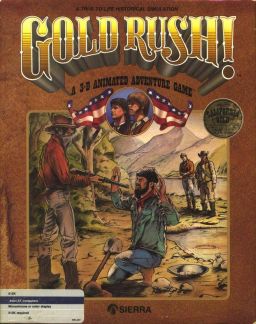
Gold Rush! is a graphic adventure video game designed by Doug and Ken MacNeill and originally released by Sierra On-Line in 1988.
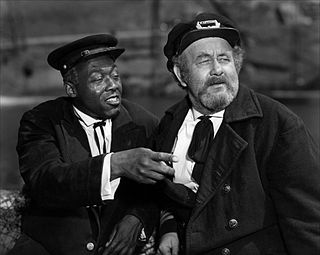
Charles Randolph "Chubby" Johnson was an American film and television supporting character actor with a genial demeanor and warm, country-accented voice.

The griffin, griffon, or gryphon is a legendary creature with the body, tail, and back legs of a lion, and the head and wings of an eagle with its talons on the front legs.
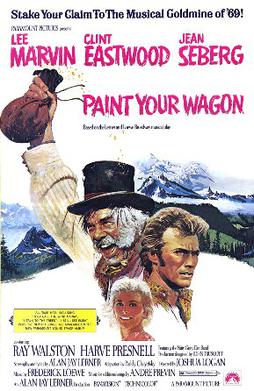
Paint Your Wagon is a 1969 American Western musical film starring Lee Marvin, Clint Eastwood, and Jean Seberg. The film was adapted by Paddy Chayefsky from the 1951 musical Paint Your Wagon by Lerner and Loewe. It is set in a mining camp in Gold Rush-era California. It was directed by Joshua Logan.
The 21st Annual Australian Recording Industry Association Music Awards were held on 28 October 2007 at the Acer Arena at the Sydney Olympic Park complex. Rove McManus was the host of the event. The nominees for all categories were announced on 19 September, while the winners of the Artisan Awards were announced on that same day.
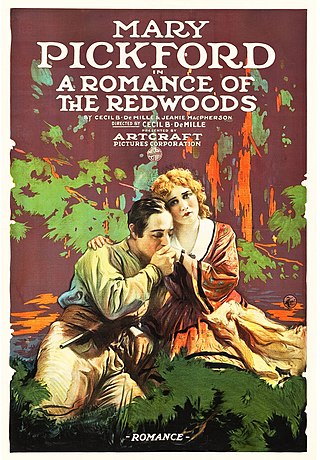
A Romance of the Redwoods is a 1917 American silent drama film directed by Cecil B. DeMille and starring Mary Pickford.

Cormoran is a giant associated with St. Michael's Mount in the folklore of Cornwall. Local tradition credits him with creating the island, in some versions with the aid of his wife Cormelian, and using it as a base to raid cattle from the mainland communities. Cormoran appears in the English fairy tale "Jack the Giant Killer" as the first giant slain by the hero, Jack, and in tales of "Tom the Tinkeard" as a giant too old to present a serious threat.

Richard H. Barter, known as "Rattlesnake Dick", was born in Lower Canada. Around 1850, he came to California on the Oregon Trail with three other family members. He tried his luck at mining at Rattlesnake Bar during the California Gold Rush. He was twice charged, and once convicted, of being a thief, the second time for stealing a mule. Once the mule and the real thief were found, he was released.

The Adventures of Bullwhip Griffin is a 1967 American Western comedy film directed by James Neilson, produced by Walt Disney Productions, starring Roddy McDowall, Suzanne Pleshette, Hermione Baddeley, and Karl Malden. The film's screenplay, by Lowell S. Hawley, was based on the novel By the Great Horn Spoon! by Sid Fleischman. The songs were written by Richard M. Sherman and Robert B. Sherman and the theme song was written by Mel Leven and George Bruns, the latter of whom also composed the film's score. It was the fifth and final film Neilson directed for Disney.

Yellow Dust is a 1936 American Western film directed by Wallace Fox from a screenplay by Cyril Hume, John Twist, and John Francis Larkin. The film stars Richard Dix and Leila Hyams, with a supporting cast including Moroni Olsen, Jessie Ralph, Andy Clyde, and Onslow Stevens. RKO Radio Pictures premiered the film in New York City on February 22, 1936, with a nationwide release on March 13.
Jack A. Marta was an American cinematographer who was active in hundreds of movies throughout his life.
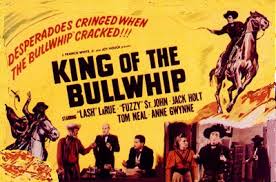
King of the Bullwhip is a 1950 American Western film produced and directed by Ron Ormond starring Lash LaRue and Al "Fuzzy" St. John. It was the eighth of LaRue's films for Ormond's Western Adventures Productions Inc. The film was the second to be released by Howco, Ron Ormond's new film company composed of Ormond and drive-in movie owners Joy N. Houck and J. Francis White, and Ormond's first film as director. The screenplay is co-written by Jack Lewis and Associate Producer Ira S. Webb. Jack Holt and Tom Neal return from the previous film but in different roles. The film was shot at the Iverson Movie Ranch.
















